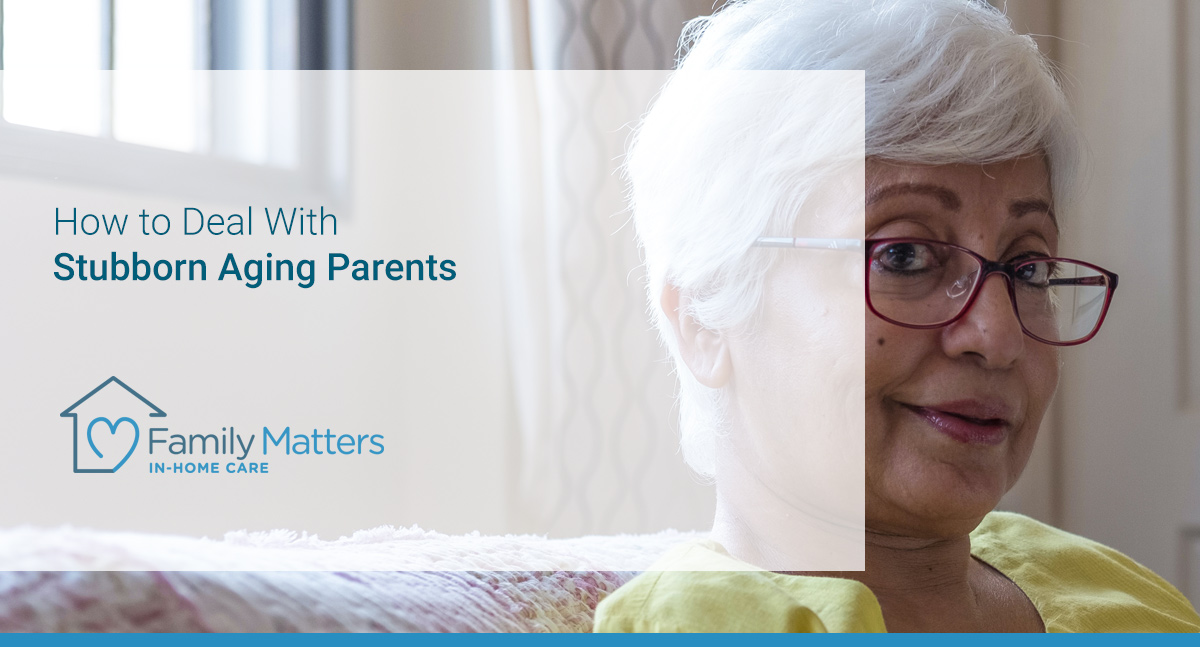
How to Deal With Stubborn Aging Parents
More and more children are becoming caregivers for their elderly parents, and often these “children” are raising children of their own. Some parents make it easy for their kids to become caregivers, but some who wish to maintain their independence may refuse assistance or aid and, therefore, can be extremely difficult to help.
With so much on your plate, you may not have the patience or even the knowledge of how to deal with stubborn, aging parents. There are a few keys we’ll outline in the article below so you and your parents can enjoy the proverbial golden years.
Why It Happens and What To Expect
Becoming older is a process that many aren’t prepared to face, no matter their age. Problems with balance, loss of strength, and confusion or forgetfulness are frustrating, especially when your aging parent remembers how they used to be. Add on the new aspect of you, their child, as a caregiver, and your aging parents may exhibit:
- Anger or feelings of hostility
- Abusive behavior or language
- Total refusal of caregiving services, medicine, or assistance
- Attention-seeking behaviors
- Personal hygiene problems
Many of these behaviors stem from fear of change, fear of the future, and loss of autonomy or feelings of powerlessness. However, some may also be caused by dementia, Alzheimer’s, or complications from other diseases or illnesses.
How to Deal with Stubborn, Aging Parents
Experiencing such a transition as that from child to caretaker is challenging, frustrating, and sometimes a bit sad. Now, imagine how your parents feel. Probably like children!
Keep these tips in mind to make all the transitions and changes go smoother for them and for you.
Identify the Root of Resentment and Anger
Of course, there’s the chance that your parents have always been angry people or prone to anger even before they reached an advanced age. If it’s not a habit, though, there could be a number of other issues underlying their anger, such as pain, depression, or feelings of powerlessness. If your parents feel helpless or powerless, anger may give them a sense of autonomy and control.
If your parent has an angry outburst or verbally attacks you, try using a distraction technique in order to change their focus.
You could also draw a firm line in the sand marking out what you will and will not tolerate. But, at the end of the day, you should approach their anger with empathy and love.
Treat Them Like Adults
Occasionally (or frequently), you may feel as though your parents act like toddlers. At these times, it’s easy to treat them as such.
However, keep in mind your parents are autonomous adults, albeit ones who need support and care. We will all be there one day.
So, if you can, give your parents the dignity they deserve. Infantilizing them will not improve your relationship and will only contribute to their anger and frustrations.
Attend Support Groups
Venting to your loved one(s) about how much they’re frustrating you isn’t the best idea. Instead, confide in friends or find support groups focused on how to deal with stubborn, aging parents as a child caretaker. Find peers who are going through similar situations and share your experiences, concerns, and strategies.
Listen to Understand
In the middle of a frustrating situation or argument with your parents, you might feel the desire to stop listening, walk away, or even dismiss their concerns or opinions altogether.
If your elderly parents think you’re not listening or not taking them seriously, it will deepen their resistance to your help and worsen resentments, too. Listen not only to hear, but listen to understand, empathize, and identify common ground between the two or three of you. When you make a point to understand the needs and concerns of your elderly parents, trust will very likely follow. The transition from a parent/child dynamic to a child/aging parent dynamic can be difficult for both you and your elderly parent(s). Try your best to understand your parent(s) and appreciate the time you have together.
If you or your family member is considering in-home care as part of a plan to age in place, contact Family Matters In-Home Care today for a free consultation. Our team is dedicated to supporting your family and helping older adults enjoy life in the comfort of their own home for as long as possible.
Some of the services offered by Family Matter In-Home Care include: Alzheimer’s & Dementia Care, Bed & Wheelchair Transfer Assistance, Companionship, Housekeeping & Meal Preparation, Personal Care, Recovery Care, and Transportation.
Serving the San Francisco Bay Area and Greater San Diego, Family Matter In-Home Care has offices throughout California including: Campbell, CA, Roseville, CA, San Marcos, CA, and San Mateo, CA.
